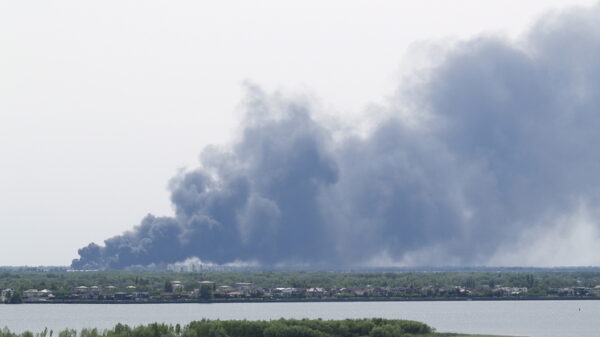 Leader Kim Jong Un has tightened border controls since the start of the pandemic. Photo: Korea Central News Agency/Korean News Service via AP File
Leader Kim Jong Un has tightened border controls since the start of the pandemic. Photo: Korea Central News Agency/Korean News Service via AP File
In-sook went into hiding with her daughter as soon as the pandemic hit China in 2020.
The young woman entered the country illegally when she fled through border from North Korea.
>
China tightened surveillance methods, meaning she could no longer continue her work at the factory without an official ID. She only dared to leave the hideout at night, when sophisticated facial recognition technology was harder to track down.
Like many women who flee the repressive North Korean regime for China, traffickers took advantage of In Sook's precarious legal position. and sold her to a Chinese man as his wife.
When he drank alcohol, he cursed and physically abused her, prompting her to make the risky decision to flee.
Unable to feed her child, in desperation she turned to the church for shelter and then to the Helping Hands of Korea (HHK), a Seoul-based group that provides escape routes for North Koreans to safety.
«I'm afraid I'll be caught by the Chinese police and repatriated to North Korea,» she told HKK, which helped a mother and daughter get to safety in Southeast Asia.
In Suk's story, told to HHK, is one of incredible hardship, but she is one of the «lucky» few North Koreans who have managed to successfully make the perilous journey across China in recent years.
Before the pandemic, South Korea annually received more than 1000 people, but since 2020 this number has decreased to 458.
As many as 2,000 defectors may currently languish in Chinese detention centers in the country's northeast, according to UN human rights envoy to North Korea Elizabeth Salmon and activist groups. If forced to repatriate, they face torture, abuse, and even death.
The pandemic has given a temporary reprieve as North Korea further isolated itself from the world to prevent the spread of the virus.
But on this week as the reclusive regime began to slowly reopen the border, resuming flights and allowing buses to enter It looks like the time for frightened refugees is running out.
Ms Salmon is reportedly following the situation «closely» and has joined South Korea in expressing concerns about repatriation to China.
«The declaration to end Covid-19, which has been welcomed by people around the world, may be terrible news, like a prelude to death, for North Korean fugitives detained in China,” said Choi Jae-hyun, a member of the South Korean National Committee. assembly.
«Political prison camps»
«North Korea is known for running one of the world's most infamous political prison camps,» he added, warning that returnees risk dying from malnutrition, disease or execution. and faced sexual abuse, forced abortion and forced labor.
In August, South Korea's Unification Ministry called on China to abide by United Nations treaties and international law to protect refugees, rather than treat them like illegal immigrants. It stated that it would accept any North Korean who seeks asylum.
“The forced repatriation of people against their will is a violation of the spirit and principles of international law, which prohibits it,” said Kim Yun-ho. Unification Minister.
Just a few days later, US media reported that China had rejected South Korea's request, although The Telegraph understands that the Unification Ministry was not formally informed of this.
The Chinese government regularly refers to people fleeing North Korea as «illegal economic migrants,» but it is hoped that the upcoming Asian Games in Hangzhou may make the authorities more sensitive to international opinion.
The Chinese Embassy in London said: «Chinese the government attaches great importance to and protects the legitimate rights and interests of foreign nationals in China in accordance with the law.”
He added that he «always properly regulates the illegal entry of DPRK citizens in accordance with domestic and international laws and for humanitarian reasons,» referring to North Korea's official name, the Democratic People's Republic of Korea.
Terrible. the dangers defectors face if they fail to escape have been well documented by human rights groups such as the North Korea Human Rights Database (NKDB) Center. ß
The Seoul-based NKKD recorded 8,125 cases of forced repatriation of North Koreans and 32,198 cases of violations of their human rights.
Tortured to death
These include the story of Song Hyun-joo, a young man who believes that his 22-year-old sister Song Geum-joo was tortured to death in 2009.
The sisters were arrested while trying to climb over the border fence between Inner Mongolia and China and handed over to the North Korean security forces.
Mr. Sun described how he was tortured with handcuffs and wooden chairs. The official cause of his sister's death was «nephritis» or inflammation of the kidneys, but he told human rights activists that «I'm sure she died because of the pain caused by the torture.»
At a June event At a forced repatriation hearing at the U.S. Congressional Executive Committee on China, Hannah Song, director of international cooperation for the NCCS, said that China's increasing use of new surveillance technologies, such as facial recognition and biometric systems, is being used as a tool to repress North Korean refugees. /p>
Using satellite imagery, NKDB and NK Pro, a Seoul-based media and research arm, documented the expansion and massive renovation between 2019 and 2022 of three key Chinese detention centers known or suspected that they are holding illegal North Koreans.< /p>
“The expansion of Chinese detention facilities right on the border with North Korea shows that China has likely increased its ability to detain North Koreans in recent years,” said Yifan Bremer, Seoul correspondent for NK News, who analyzed the situation. photos.
























































Свежие комментарии